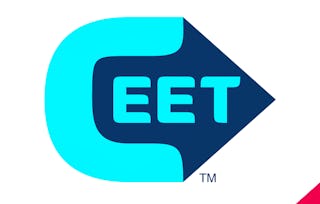Leading a data-driven organization necessitates effective communication to create a culture of ethical practice. Communication to stakeholders will guide an organization's strategy and potentially impact the future of work for that organization or entity. It is not enough to talk about ethical practices, you need to to relate their value to stakeholders. Building out strategies that are inclusive and relatable can build public trust and loyalty, and knowing how to plan for a crisis will reduce the harm to such trust and loyalty.

Communicate Effectively about Ethical Challenges in Data-Driven Technologies

Communicate Effectively about Ethical Challenges in Data-Driven Technologies
This course is part of CertNexus Certified Ethical Emerging Technologist Professional Certificate

Instructor: Jennifer Fischer
22,270 already enrolled
Included with
95 reviews
Recommended experience
What you'll learn
Develop inclusive strategies to clearly communicate the business impacts of ethical risks to diverse stakeholders.
Design communication strategies that are diverse, equitable, and inclusive.
Design a crisis communication plan to manage internal and external stakeholders during an ethical controversy.
Skills you'll gain
Details to know

Add to your LinkedIn profile
See how employees at top companies are mastering in-demand skills

Build your Machine Learning expertise
- Learn new concepts from industry experts
- Gain a foundational understanding of a subject or tool
- Develop job-relevant skills with hands-on projects
- Earn a shareable career certificate from CertNexus

There are 5 modules in this course
The first module in this course begins by covering the ethical risks a data-driven organization faces, the impacts those risks have on the business, as well as strategies for communicating these ideas. Effective communication to a diverse array of stakeholders is crucial for maintaining their trust, as well as for fostering a culture of ethical business practices.
What's included
16 videos2 readings1 assignment1 discussion prompt
Now that you understand the importance of communicating ethical risks and their impacts, you'll be able to start designing more in-depth communication strategies for addressing those issues. These strategies will enable you to promote your ethical principles and activities to both internal and external stakeholders.
What's included
15 videos1 reading1 assignment1 discussion prompt
Ethical crises are inevitable, no matter how diligent you are in your ethical business practices. You need to plan for this eventuality by ensuring you have a robust and effective crisis management process in place. Communication is a critical portion of crisis management, as it ensures that stakeholders are kept informed of the facts and not led astray by misinformation.
What's included
12 videos1 reading1 assignment1 discussion prompt
You've learned about general principles of crisis management, particularly how to maintain communications with internal stakeholders. But there's another, equally important entity that you need to communicate with during and after a crisis: the media. The media can often be the deciding factor in the continued success of your organization in the event of an ethical crisis.
What's included
10 videos1 reading1 assignment1 discussion prompt
You'll work on one or more projects in which you'll apply your knowledge of the material in this course to practical scenarios.
What's included
2 readings2 peer reviews
Earn a career certificate
Add this credential to your LinkedIn profile, resume, or CV. Share it on social media and in your performance review.
Instructor

Offered by
Explore more from Machine Learning
 Status: Free Trial
Status: Free Trial Status: Free Trial
Status: Free Trial Status: Free Trial
Status: Free Trial Status: Free Trial
Status: Free TrialCertNexus
Why people choose Coursera for their career

Felipe M.

Jennifer J.

Larry W.

Chaitanya A.
Learner reviews
- 5 stars
72.63%
- 4 stars
15.78%
- 3 stars
0%
- 2 stars
3.15%
- 1 star
8.42%
Showing 3 of 95
Reviewed on May 23, 2023
Excellent information provided through the course.The instructor is very knowledgeable and provided key insights into real-time examples.
Reviewed on Jun 16, 2024
Instructor is having sound knowledge on the topic, well organized course !!

Open new doors with Coursera Plus
Unlimited access to 10,000+ world-class courses, hands-on projects, and job-ready certificate programs - all included in your subscription
Advance your career with an online degree
Earn a degree from world-class universities - 100% online
Join over 3,400 global companies that choose Coursera for Business
Upskill your employees to excel in the digital economy
Frequently asked questions
To access the course materials, assignments and to earn a Certificate, you will need to purchase the Certificate experience when you enroll in a course. You can try a Free Trial instead, or apply for Financial Aid. The course may offer 'Full Course, No Certificate' instead. This option lets you see all course materials, submit required assessments, and get a final grade. This also means that you will not be able to purchase a Certificate experience.
When you enroll in the course, you get access to all of the courses in the Certificate, and you earn a certificate when you complete the work. Your electronic Certificate will be added to your Accomplishments page - from there, you can print your Certificate or add it to your LinkedIn profile.
More questions
Financial aid available,
¹ Some assignments in this course are AI-graded. For these assignments, your data will be used in accordance with Coursera's Privacy Notice.

